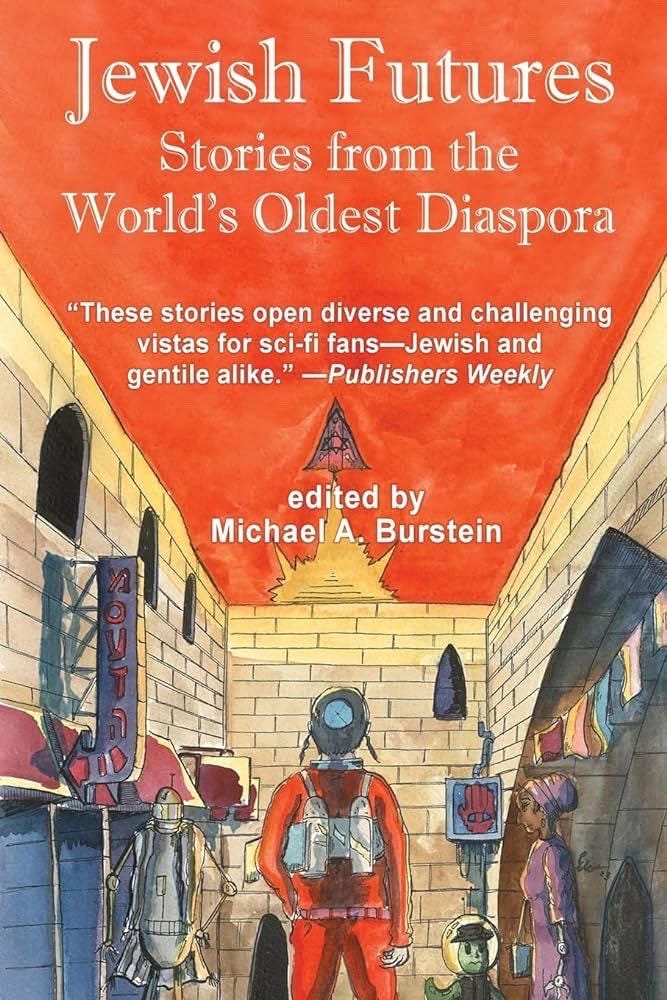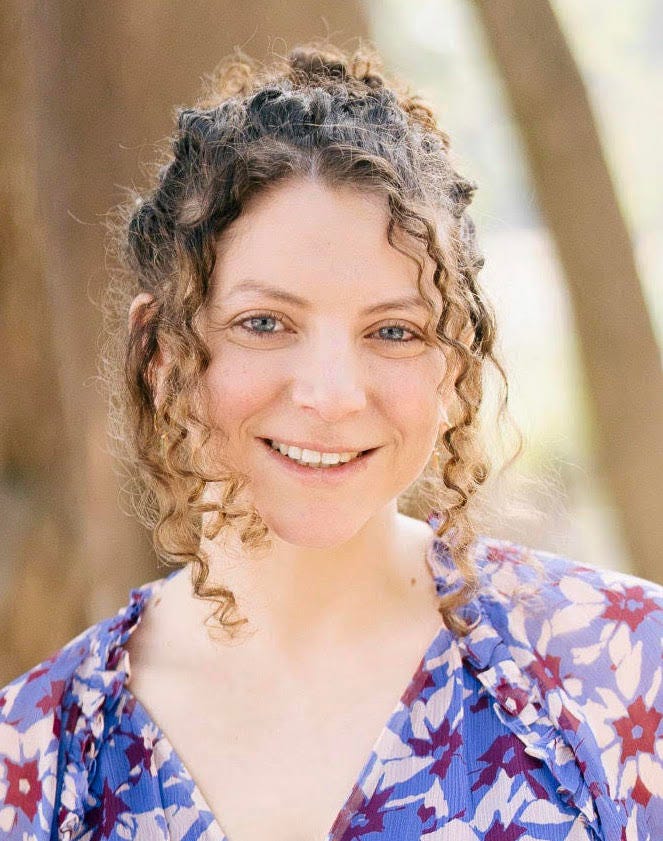Jewish Science Fiction and the Jewish Future
It could be more than space lasers.
Hi! My name is Riv, and I am a writer based in Switzerland. I recently had a story published in the Jewish Futures anthology edited by Michael A. Burstein. This anthology contains futuristic stories with Jewish themes: from aliens seeking to convert to Judaism and then try to return to an abandoned Jerusalem on a deserted Earth, to baby robot golems.
My story, titled “Proof of Alina,” is about a not-so-distant future where technocrats rule and AI is God. A Jewish philosopher of physics discovers the world was created intentionally, and she has to deal with the consequences from both the religious community and the AI overlords. I was inspired by Yuval Noah Harari’s chapter in Sapiens on techno religions, the Jewish concept of God, and my brief time spent in a mountain hut in the Swiss Alps.
I loved writing a Jewish sci-fi story–not just because I spend a lot of time thinking about the Jewish future, but also because I spend a lot of time thinking about the Jewish past–and sci-fi happens to be a very important part of the Jewish past. Not just the past that includes my father’s very own childhood sci-fi club (the reason I grew up with books like A Princess of Mars on my bookshelf), but the past that includes the Jewish writer Isaac Asimov, one of the most prominent sci-fi writers, and in Poland, Stanislaw Lem, another Jewish writer, one of the best known writers for his novel Solaris. Frank Herbert wasn’t Jewish, but Jews make an appearance at the end of his Dune series, space Jews hiding out in the cosmos and keeping true to our old way of life.
As a Jewish person, I feel I am part of a long chain of a story bigger than myself. I loved getting to contribute to the long chain of Jewish science fiction that already exists.
What is it about being Jewish that draws us to science fiction? I once read that we’ve always preferred science fiction over high fantasy because our past was never quite a fantasy. As a writer focusing on Jewish stories, I often struggle to find a whole decade to write in without an antisemitic attack or massacre. As much as I love the music in “Fiddler on the Roof,” I’m not romanticizing the idea of going back in time to my ancestor’s shtetls any more than I romanticize expulsion from the multiple European countries that led them there in the first place.
The Jewish fantasy writing that does exist is often melancholic. It’s more likely to include ghosts and unsettled souls than dragons and knights. Like many a Jewish writer before me, I struggle to end my own historical novels on a completely happy note. Like a perpetual breaking glass at a wedding, my writing seems to always drift toward the bittersweet.
The future, however, feels different. Science fiction is a clean slate, a fresh opportunity to imagine a new future for Jews with its own challenges. It’s a space where we can do what we do best–ask questions.
Like Torah, Jewish literature is a living, breathing thing. We are in conversation with each other, questioning how to deal with the present and future, debating the ethics of new technologies and discoveries. Maybe that’s what makes science fiction so Jewish–it’s often meant to spark discussion, to conjecture, like a new generation of Talmudic scholars debating the kosher status of cloned meats.
My story is just one contribution to the world of Jewish sci-fi, a sentence in the midst of a whole universe of Jewish sci-fi. I’d love for you to read it and continue the conversation.
Sneak peak of “Proof of Alina:”:
Alina wouldn’t have been the first Jew to hide away in Switzerland, and she definitely wouldn’t be the last. When I found her there in that mountain hut at the base of the Matterhorn, I might have been the one person in the world who wasn’t seeking her out. It was a three day hike. I was supposed to be reporting on the shrinking glaciers–of course, I would be about the one thousandth science journalist to do so. But at least now, after the dark times, I was actually able to report on them.
We got to the hut close to dark, when the wind was already picking up on the mountain, our legs tired from a long day hiking. My photographer, Neil, was so tired he immediately laid out his sleeping bag and fell asleep in the bunk. I was still hungry, so I stayed in the main dining area for a plate of rosti and sausage–lab grown, of course, now that the Rabbinical courts had decided if it was lab grown it was kosher.
My waitress brought over the steaming plate of what I thought looked like hashbrowns and sausage–but I hadn’t had hashbrowns for a long time, not since I lived in America. And like most other Jews, I wasn’t there anymore. I probably wouldn’t be going back for a long time.
Riv Begun is a Posse Foundation alumni from Atlanta, Georgia. She's had flash fiction stories published in Write Haus Magazine, Slippage Lit, and Format.Papier and nonfiction work published in Naturally Curly and The Jewish Press. In 2023, Her story on Jewish Pirates was published in the Days of Awe anthology and her science-fiction story about AI, the Swiss Alps, and physics was published in the Jewish Futures anthology. She writes strange things, weird short fiction, and novels inspired by Jewish magic and folktales. She lives in Switzerland with her family, where she spends her time fostering rescue dogs and taking walks in the forest by her house. She can be found on Twitter at @BegunRiv, Instagram at @RivBegun, and at her website, rivbegun.com. Subscribe to her monthly newsletter at tinyurl.com/rivbegun.
Are you a Jewish writer or have an interesting story? I’d love to feature/interview you! Reply to this email with Jewish pride and enthusiasm. Shabbat Shalom! -Miranda



